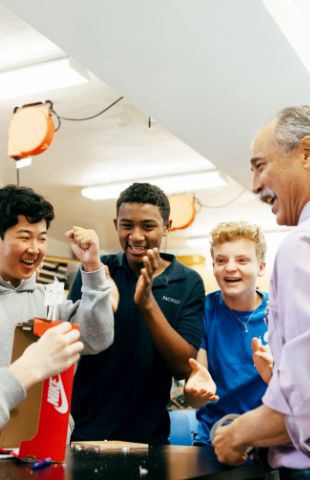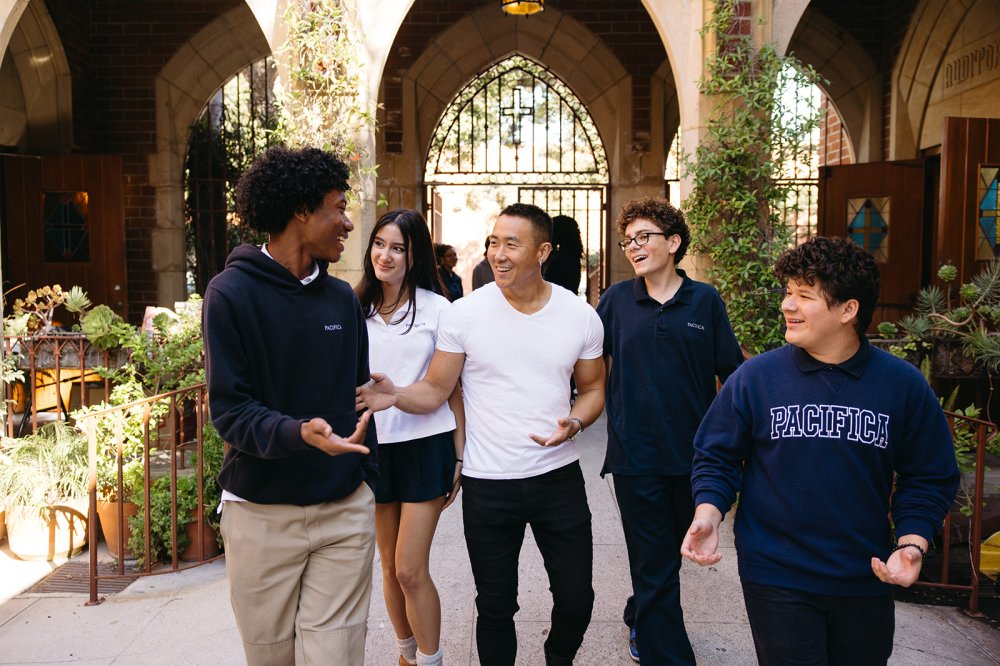-
About
- Welcome to Pacifica
- Mission & Culture
- Pacifica Stories
- Leadership & Faculty
- From All Neighborhoods
- Our Staff
- Careers at Pacifica
- Contact & Location
- Areas We Serve
-
Admissions
- Welcome & Overview
- Why Pacifica
- Request Information
- Visit Pacifica
- Applying to Pacifica
- Tuition
- Transportation
- International Students
-
Academics
- Academic Overview
- A Pacifica Education
- AP & Honors
- The College Path
- Signature Programs
- College Acceptances
- PACARTS
-
Athletics
- Athletics at Pacifica
- Teams & Schedules
- Coaching Staff
- Athletics Calendar
- College Athletics
- Seawolf Pride
- Volleyball Training Program
-
Pacifica Life
- Student Experience
- Pacifica Traditions
- Leadership & Clubs
- Travel Program
- Spiritual Life
- Parent Association
- Alumni Association
- 20th Anniversary Gala
- Spirit Store
« Back
In Their Own Words: Pacifica's Core Values
June 18th, 2024
We asked Pacifica staff and faculty members to describe our seven core values in their own words– whether it be how they see this value lived out on campus, why we choose it as a pillar of our school, or what the value means for our students. Read their thoughts here!
STUDENT FORMATION
 “During spring break, Pacifica had the chance to take close to 60 juniors and seniors to Italy to walk among Western Civilization's greats and take in the art and culture from the past that shapes us today in the present. In Florence, we had the chance to see the statue of David at the Galleria dell'Accademia, standing out as a breathtaking piece of art towering over 17 feet and weighing over 12,000 pounds.
“During spring break, Pacifica had the chance to take close to 60 juniors and seniors to Italy to walk among Western Civilization's greats and take in the art and culture from the past that shapes us today in the present. In Florence, we had the chance to see the statue of David at the Galleria dell'Accademia, standing out as a breathtaking piece of art towering over 17 feet and weighing over 12,000 pounds.
For Michelangelo, the act of sculpting is described as ‘liberating figures that were already existent in the stone’ and at Pacifica, our philosophy of formation over performance mirrors Michelangelo's eye for beauty in his work. That as humans, we are created perfectly in God's image but due to the brokenness of the world, are in a process of formation to be more like that of our Creator.
Prior to David being ‘David’, the slab of marble, while grand in nature, was marred with imperfections. Shaped too narrow in the middle, riddled with cracks, the marble was seen as unworkable by many. For Michelangelo, he saw beauty in the imperfections. A masterpiece waiting to be formed into something more. God sees beauty through our imperfections and at Pacifica, we are like Michelangelo's stones of marble being formed into something more. Beauty formed from the broken.”
- Wally Hirsch, Associate Head of School for Student Affairs
COMMITMENT TO THE GREAT CONVERSATION
 “The Pacifica community is involved in the Great Conversation. It requires us to learn and engage the voices of the past and voices different from our own. Whether that be authors from the ancient world, streams of thought from the 20th Century, or words of wisdom from grandparents, the key is to understand and soak in other points of view before they are dismissed.
“The Pacifica community is involved in the Great Conversation. It requires us to learn and engage the voices of the past and voices different from our own. Whether that be authors from the ancient world, streams of thought from the 20th Century, or words of wisdom from grandparents, the key is to understand and soak in other points of view before they are dismissed.
As we listen and practice intellectual hospitality, our community displays a key academic virtue necessary for growth, humility. This is essential in honoring others and developing our own voices. Too often, we practice, as C.S. Lewis puts it, chronological snobbery, whereby we dismiss anything that comes before and anything that is not ours. In the Great Conversation, we first listen to the words of Plato, Christ, St. Augustine, William Shakespeare, Mary Wollstonecraft, Abraham Lincoln, Friedrich Nietzche, Karl Marx, Dorothy Sayers, and Zora Neale Hurston, among others, seeking to understand while crafting our own voices. We are not seeking agreement but truth. As we charitably engage, listen, and think, perhaps we might contribute something of our own voice to the Great Conversation.”
- Jim Knight, Head of School
PURSUIT OF TRUTH, BEAUTY, AND GOODNESS
 “At Pacifica, it is practically assumed that every student, indeed every human, naturally wishes to possess truth, beauty, and goodness. Students ask questions because they want truth, not lies; they are attracted to and even strive to produce that which is beautiful, not ugly; and they naturally seek to do what they believe is good in some way.
“At Pacifica, it is practically assumed that every student, indeed every human, naturally wishes to possess truth, beauty, and goodness. Students ask questions because they want truth, not lies; they are attracted to and even strive to produce that which is beautiful, not ugly; and they naturally seek to do what they believe is good in some way.
The ‘pursuit’ of these core values consists in a humble willingness to grow in understanding, such that we remain willing to discard opinions we once thought were true and replace them with more reasonable alternatives; to grow beyond childish attractions as our sensitivity to beauty deepens; to reject modes of living that we once thought were justified but have come to see were at odds with our greatest good, the good of others, and the will of God, which is no less than the previous two.
Learning in all its forms requires humility, and the best teachers are perpetual, active learners. At Pacifica, this humility is expressed and encouraged by that other core value, intellectual hospitality, where the true, the good, and the beautiful take precedence over merely winning arguments. We cultivate an atmosphere that reminds us that, in the discussion of the good, the true, and the beautiful, to merely win the day is meaningless. It is the eternal that we seek.”
- Dan Freeborn, Philosophy Teacher
COMMITMENT TO INQUIRY, RHETORIC, AND PROBLEM-SOLVING
“Pacifica’s commitment to inquiry, rhetoric, critical thinking and problem solving is clearly displayed in core STEM classes taught here. A common teaching practice involves introducing a new concept in a way that will naturally lead to inquiry or the need for problem-solving. Through a demonstration or interesting problem, the students end up asking: ‘How does that work?’ or ‘Why did that happen?’ From there, with a bit of direct instruction, the students seek to solve the problem and discover the principles behind the new phenomenon they have witnessed. These methods evoke inquiry, and regularly ask students to use their critical thinking skills to solve problems.”
- Nicole Geiger, Biology Teacher
JOY IN LEARNING
 “Recently, a mentor of mine smiled when I was feeling sheepish at the amount of questions that I had for her. She smiled and assured me, ‘That's because you are a lifelong learner.’ It's that curiosity and love for knowledge and experiences that propel me to work with students. Finding joy in learning is a gift, a motivator, and a catalyst for growth. When I have students standing in front of a classroom excited about their projects - digging into new techniques of materials, or telling other students about what excited them on a trip to a museum - I know the joy is there. Creating a classroom culture that is encouraging, inspiring and productive is key to this goal and it's what motivates me as a teacher as well.”
“Recently, a mentor of mine smiled when I was feeling sheepish at the amount of questions that I had for her. She smiled and assured me, ‘That's because you are a lifelong learner.’ It's that curiosity and love for knowledge and experiences that propel me to work with students. Finding joy in learning is a gift, a motivator, and a catalyst for growth. When I have students standing in front of a classroom excited about their projects - digging into new techniques of materials, or telling other students about what excited them on a trip to a museum - I know the joy is there. Creating a classroom culture that is encouraging, inspiring and productive is key to this goal and it's what motivates me as a teacher as well.”
- Liberty Worth, Art Teacher
AUTHENTIC RELATIONAL COMMUNITY
“It is my hope and prayer that our students know that they are loved. This drives the type of relational community that we endeavor to cultivate here at Pacifica. Committing to this demands that we as faculty and staff go beyond the traditional remits of our vocation, but it is a privilege to be entrusted with the next generation of young people, and we are beholden to a higher standard. We are dedicated to steward this responsibility well, and as best we can serve, as conduits of the divine love Jesus has modeled for us.”
- Albert Kong, Director of Student Life
INTEGRATION OF FAITH AND LEARNING
 “The integration of Faith in learning begins with the idea that all truth is God’s truth. This removes barriers, as any question can be considered and no subject is beyond our examination. We can learn from the Christian text and the non-Christian. It proceeds with the practice of intellectual humility and hospitality as we work as a community toward the truth whether it be in history, theology, literature or the sciences. These two are key because humility places us in our proper position as learners and hospitality allows us to work with people who disagree with us. It continues with the recognition that because all truth is God’s truth, that the truth we see in one subject is connected to the other disciplines that we study. It culminates in a student that is capable of both thinking and living well as the truth that we have wrestled with helps to guide our thinking and how we relate to God and our neighbor.”
“The integration of Faith in learning begins with the idea that all truth is God’s truth. This removes barriers, as any question can be considered and no subject is beyond our examination. We can learn from the Christian text and the non-Christian. It proceeds with the practice of intellectual humility and hospitality as we work as a community toward the truth whether it be in history, theology, literature or the sciences. These two are key because humility places us in our proper position as learners and hospitality allows us to work with people who disagree with us. It continues with the recognition that because all truth is God’s truth, that the truth we see in one subject is connected to the other disciplines that we study. It culminates in a student that is capable of both thinking and living well as the truth that we have wrestled with helps to guide our thinking and how we relate to God and our neighbor.”
- Scott Comer, History and Theology Teacher
Posted in the category Pacifica Values.
Categories
Recent Articles
10 Reasons Content Box

10 Reasons to Choose Pacifica





